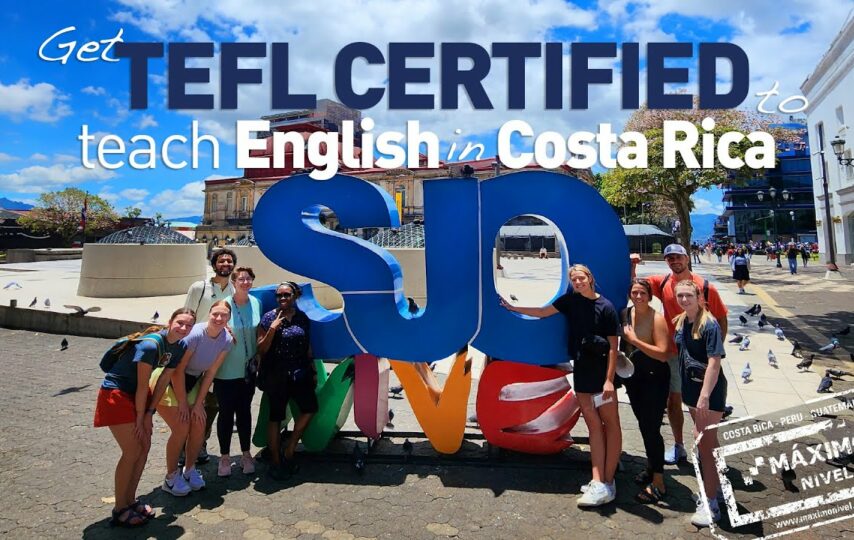Teaching English as a foreign language (TEFL) has been gaining enormous importance in recent times, as the world continues to be interconnected by technology and globalization. Among the major challenge faced by non-native speakers worldwide is fluency in oral communication where the students must have the capability to converse fluently with ease. This aspect is highly imperative in Costa Rica, a country where English is taught as a second language from the primary school level. Therefore, oral TEFL in Costa Rica is incredibly vital in facilitating effective communication in the English language. This blog will highlight the importance of oral TEFL in Costa Rica’s educational landscape.
The importance of teaching English as a foreign language, or English as a Foreign, has increased in the country’s schools during the past couple of decades. Both professionals and students are looking ahead to learning English because it’s an essential trait for career growth. Hence, the demand for TEFL instructors proficient in both oral and written communication keeps increasing. While both aspects of TEFL are vital, oral communication plays a critical role in conceptualizing the language and retaining it in the long term. In this article, we will highlight the importance of oral TEFL in Costa Rica’s educational landscape and how it has become a vital aspect of teaching and learning the language.
Improves learner’s focus on Communication: The primary objective of English language instruction is to transmit information and convey meanings through speaking and writing. However, learners’ listening and speaking skills are vital in ensuring successful communication. Oral TEFL training in Costa Rica’s education landscape emphasizes listening and speaking skills, bellwether to better communication and successfully conversing in English. Therefore, a stronger emphasis on oral TEFL enables learners to use their acquired language skills to interact with peers, professionals, and the global community in general.
Strengthens Language Fluency
Oral assessments are an effective way of measuring a learner’s language proficiency level. A learner’s ability to communicate demonstrates their mastery of the language. Oral TEFL instructors in Costa Rica are intentional in nurturing a learner’s fluency. Through pronunciation drills, intonation practices, and overall speaking exercises, an ESL learner can develop their proficiency and communicate effectively in English.
Enhances learner’s confidence
Oral presentations and conversations can be daunting for non-native English speakers, particularly in academic and professional settings. Oral TEFL teachers in Costa Rica focus on instilling confidence in their learners with personalized attention, feedback, and exercises, building on their learners’ strengths and areas for improvement. Confidence boosts learners’ ability to articulate their thoughts and ideas and contribute effectively to Group discussions and class discourse.
Prepares learners for Global Opportunities
With the world turning into a global village, proficiency in English becomes increasingly important. Oral TEFL in Costa Rica’s education landscape prepares learners for global opportunities, be it academic, professional, or travel. Costa Rican oral TEFL Instructors provide real-life situational training through oral speaking exams, group conversations, and group presentations, enhancing learners’ ability to apply their English in real-world situations.
Cultivates a More Engaging Learning Environment
Oral TEFL instructors in Costa Rica create an engaging learning environment in collaboration with their learners. This partnership exercises learners’ creativity and critical thinking skills, leading to increased problem-solving. The teacher’s dynamic teaching style with audio-visual teaching materials and real-world examples also keeps the classroom interesting, stimulating learners’ interest in the subject. This collaboration enables learners to start thinking in English with their increased proficiency, simultaneously enhancing their overall academic performance.
Boost the Level of Fluency
Fluency is the cornerstone of communication in English, and thus emphasizing on improving fluency in oral TEFL is crucial to achieve success in English language learning. Oral TEFL techniques develop students’ ability to communicate fluently, confidently, and intelligibly in the English language. The students can learn to communicate orally in a more natural manner through oral TEFL techniques. They also can develop intonation, rhythm, stress, and pronunciation, which will help them to convey the intended message effectively while communicating in English.
Enhance Confidence
Research indicates that students who are confident in their abilities to speak English live out successful and productive lives. Oral TEFL focuses on developing the confidence of students to communicate fluently and effectively in English. By developing oral communication skills in a comfortable and supportive environment, students become more confident and motivated when using the language. As a result, they can meet their communication challenges both in school and beyond, which can facilitate better career opportunities in the future.
Create a Linguistic Environment
Oral TEFL enables teachers to create a linguistically stimulating environment in the classroom. Teachers can use engaging activities to instill interest in learning English and encourage oral participation in the class. Additionally, using multimedia tools, teachers can provide learners with the opportunity to develop their oral communication skills by creating real-life situations that can be practiced early on in the learning process. Adopting these innovative methods will encourage learners to communicate more often, resulting in more significant language growth.
Build Cultural Awareness
Apart from building fluency, oral TEFL also promotes intercultural communication through the sharing of ideas and information about culturally diverse practices. By learning this aspect, Costa Rican students can develop a deeper understanding of the English language, learn about different cultures, and become more culturally sensitive, which helps to strengthen their communication and build bridges with other cultures.
Boost Economic Wellbeing
Enhancing oral communication skills can have significant economic implications. English has become a universal language that can break barriers to global communication, thereby providing broader opportunities in the international job market. In Costa Rica, having expertise in spoken English is an advantage when it comes to obtaining foreign job opportunities or working with multinational companies, particularly those that are English-based. By developing oral communication skills, one can embark on a path towards financial stability and a better life for oneself and one’s family.
Conclusion:
In a nutshell, oral TEFL forms an essential aspect of Costa Rica’s educational landscape since it helps learners to communicate more effectively and fluently in English. Oral TEFL benefits the learners by developing confidence, fluency, cultural awareness, and creating a linguistically stimulating environment. It can also have economic implications where the learners can enjoy better career opportunities both nationally and internationally. Given these benefits, it is evident that oral TEFL is a crucial aspect of Costa Rica’s educational landscape, and it should receive more emphasis as language barriers continue to impact the country’s position in the globalized world.
In conclusion, oral TEFL has become an essential aspect of Costa Rica’s education landscape. The demand for immersive English education with an emphasis on listening and speaking skills continues to grow, expanding the opportunities for learners and professionals in the field. The significance of oral TEFL in education in Costa Rica is in providing learners with effective communication skills, strengthening fluency, building confidence, preparing them for global opportunities, and cultivating a more engaging learning environment. To conclude, Oral TEFL in Costa Rica is critical in providing learners with functional and practical communication skills, preparing them for success in professional, academic and personal arenas.








